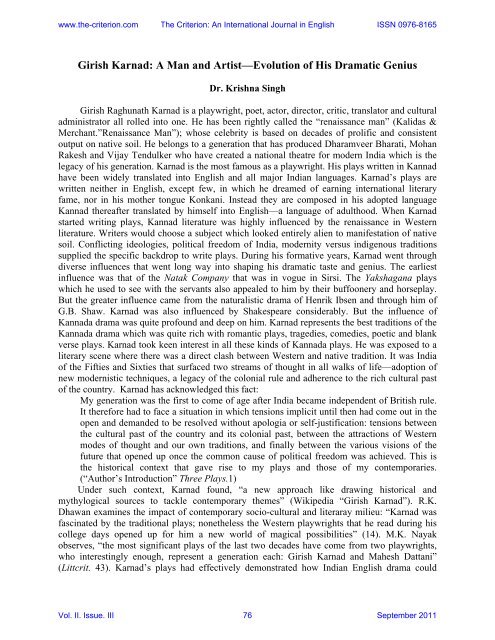Vol. II. Issue. III September 2011 - The Criterion: An International ...
Vol. II. Issue. III September 2011 - The Criterion: An International ...
Vol. II. Issue. III September 2011 - The Criterion: An International ...
Create successful ePaper yourself
Turn your PDF publications into a flip-book with our unique Google optimized e-Paper software.
www.the-criterion.com <strong>The</strong> <strong>Criterion</strong>: <strong>An</strong> <strong>International</strong> Journal in English ISSN 0976-8165<br />
Girish Karnad: A Man and Artist—Evolution of His Dramatic Genius<br />
Dr. Krishna Singh<br />
Girish Raghunath Karnad is a playwright, poet, actor, director, critic, translator and cultural<br />
administrator all rolled into one. He has been rightly called the “renaissance man” (Kalidas &<br />
Merchant.”Renaissance Man”); whose celebrity is based on decades of prolific and consistent<br />
output on native soil. He belongs to a generation that has produced Dharamveer Bharati, Mohan<br />
Rakesh and Vijay Tendulker who have created a national theatre for modern India which is the<br />
legacy of his generation. Karnad is the most famous as a playwright. His plays written in Kannad<br />
have been widely translated into English and all major Indian languages. Karnad’s plays are<br />
written neither in English, except few, in which he dreamed of earning international literary<br />
fame, nor in his mother tongue Konkani. Instead they are composed in his adopted language<br />
Kannad thereafter translated by himself into English—a language of adulthood. When Karnad<br />
started writing plays, Kannad literature was highly influenced by the renaissance in Western<br />
literature. Writers would choose a subject which looked entirely alien to manifestation of native<br />
soil. Conflicting ideologies, political freedom of India, modernity versus indigenous traditions<br />
supplied the specific backdrop to write plays. During his formative years, Karnad went through<br />
diverse influences that went long way into shaping his dramatic taste and genius. <strong>The</strong> earliest<br />
influence was that of the Natak Company that was in vogue in Sirsi. <strong>The</strong> Yakshagana plays<br />
which he used to see with the servants also appealed to him by their buffoonery and horseplay.<br />
But the greater influence came from the naturalistic drama of Henrik Ibsen and through him of<br />
G.B. Shaw. Karnad was also influenced by Shakespeare considerably. But the influence of<br />
Kannada drama was quite profound and deep on him. Karnad represents the best traditions of the<br />
Kannada drama which was quite rich with romantic plays, tragedies, comedies, poetic and blank<br />
verse plays. Karnad took keen interest in all these kinds of Kannada plays. He was exposed to a<br />
literary scene where there was a direct clash between Western and native tradition. It was India<br />
of the Fifties and Sixties that surfaced two streams of thought in all walks of life—adoption of<br />
new modernistic techniques, a legacy of the colonial rule and adherence to the rich cultural past<br />
of the country. Karnad has acknowledged this fact:<br />
My generation was the first to come of age after India became independent of British rule.<br />
It therefore had to face a situation in which tensions implicit until then had come out in the<br />
open and demanded to be resolved without apologia or self-justification: tensions between<br />
the cultural past of the country and its colonial past, between the attractions of Western<br />
modes of thought and our own traditions, and finally between the various visions of the<br />
future that opened up once the common cause of political freedom was achieved. This is<br />
the historical context that gave rise to my plays and those of my contemporaries.<br />
(“Author’s Introduction” Three Plays.1)<br />
Under such context, Karnad found, “a new approach like drawing historical and<br />
mythylogical sources to tackle contemporary themes” (Wikipedia “Girish Karnad”). R.K.<br />
Dhawan examines the impact of contemporary socio-cultural and literaray milieu: “Karnad was<br />
fascinated by the traditional plays; nonetheless the Western playwrights that he read during his<br />
college days opened up for him a new world of magical possibilities” (14). M.K. Nayak<br />
observes, “the most significant plays of the last two decades have come from two playwrights,<br />
who interestingly enough, represent a generation each: Girish Karnad and Mahesh Dattani”<br />
(Littcrit. 43). Karnad’s plays had effectively demonstrated how Indian English drama could<br />
<strong>Vol</strong>. <strong>II</strong>. <strong>Issue</strong>. <strong>II</strong>I 76 <strong>September</strong> <strong>2011</strong>
















